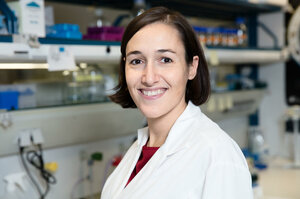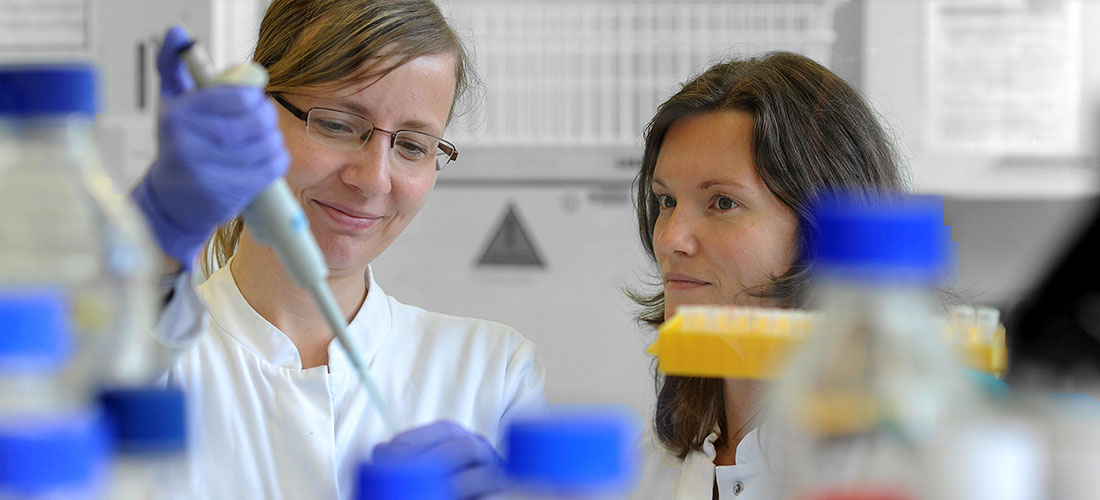Dr. Michela Di Virgilio

DNA Repair and Maintenance of Genome Stability
Max-Delbrück Center for Molecular Medicine (MDC)
Robert-Rössle-Str. 10
13092 Berlin
Germany
Tel: +49 30 9406 3846
E-Mail: Michela.DiVirgilio(at)mdc-berlin.de
https://www.mdc-berlin.de/di-virgilio
Scientific Scope
Genomic DNA is constantly under the assault of both endogenous and exogenous damaging sources. As a result, our cells experience a multitude of DNA lesions every day. Among all the different types of DNA damage, DNA double-strand breaks (DSBs) represent one of the most dangerous lesions since they may lead to cancer-prone genome alterations. DSBs arise following exposure to ionizing radiation or radio-mimetic chemicals, but they are also generated as a by-product of normal cellular metabolism, with the majority of spontaneous DSBs originating during DNA replication. In addition to these accidental breaks, DSBs can be introduced in a programmed manner as intermediates of physiological processes such as Class Switch Recombination (CSR) in B lymphocytes, a deletional recombination reaction that changes the constant region of the antibody molecule, altering its effector function. Accurate repair of both accidental and programmed DSBs is therefore crucial to ensure both the preservation of genome integrity and the generation of genome diversity.
The research in my laboratory aims at addressing a fundamental question in Life Sciences: What are the molecular mechanisms that ensure both the integrity and diversity of our genome by modulating DSB formation and by steering their repair towards the appropriate physiological outcome? We employ mature B lymphocytes as ideal model system since in addition to experiencing programmed DNA breaks during CSR, these cells are highly proliferative and therefore susceptible to stochastic replication-associated damage, thus allowing us to comprehensively investigate the mechanisms ensuring genome diversity and stability, and their relationship.
Group Members
Selected References
- Sundaravinayagam, D., Rahjouei, A., Andreani, M., Tupiņa, D., Balasubramanian, S., Saha, T., Delgado-Benito, V., Coralluzzo, V., Daumke, O., & Di Virgilio, M. (2019). 53BP1 Supports Immunoglobulin Class Switch Recombination Independently of Its DNA Double-Strand Break End Protection Function. Cell reports, 28(6), 1389–1399.e6.
- Saha, T., Sundaravinayagam, D., & Di Virgilio, M. (2021). Charting a DNA Repair Roadmap for Immunoglobulin Class Switch Recombination. Trends in biochemical sciences, 46(3), 184–199.
- Delgado-Benito, V., Berruezo-Llacuna, M., Altwasser, R., Winkler, W., Sundaravinayagam, D., Balasubramanian, S., Caganova, M., Graf, R., Rahjouei, A., Henke, M. T., Driesner, M., Keller, L., Prigione, A., Janz, M., Akalin, A., & Di Virgilio, M. (2020). PDGFA-associated protein 1 protects mature B lymphocytes from stress-induced cell death and promotes antibody gene diversification. The Journal of experimental medicine, 217(10), e20200137.
- Sundaravinayagam, D., Rahjouei, A., Andreani, M., Tupiņa, D., Balasubramanian, S., Saha, T., Delgado-Benito, V., Coralluzzo, V., Daumke, O., & Di Virgilio, M. (2019). 53BP1 Supports Immunoglobulin Class Switch Recombination Independently of Its DNA Double-Strand Break End Protection Function. Cell reports, 28(6), 1389–1399.e6.
- Delgado-Benito, V., Rosen, D. B., Wang, Q., Gazumyan, A., Pai, J. A., Oliveira, T. Y., Sundaravinayagam, D., Zhang, W., Andreani, M., Keller, L., Kieffer-Kwon, K. R., Pękowska, A., Jung, S., Driesner, M., Subbotin, R. I., Casellas, R., Chait, B. T., Nussenzweig, M. C., & Di Virgilio, M. (2018). The Chromatin Reader ZMYND8 Regulates Igh Enhancers to Promote Immunoglobulin Class Switch Recombination. Molecular cell, 72(4), 636–649.e8.
- Boege, Y., Malehmir, M., Healy, M. E., Bettermann, K., Lorentzen, A., Vucur, M., Ahuja, A. K., Böhm, F., Mertens, J. C., Shimizu, Y., Frick, L., Remouchamps, C., Mutreja, K., Kähne, T., Sundaravinayagam, D., Wolf, M. J., Rehrauer, H., Koppe, C., Speicher, T., Padrissa-Altés, S., … Weber, A. (2017). A Dual Role of Caspase-8 in Triggering and Sensing Proliferation-Associated DNA Damage, a Key Determinant of Liver Cancer Development. Cancer cell, 32(3), 342–359.e10.
- Sander, S., Chu, V. T., Yasuda, T., Franklin, A., Graf, R., Calado, D. P., Li, S., Imami, K., Selbach, M., Di Virgilio, M., Bullinger, L., & Rajewsky, K. (2015). PI3 Kinase and FOXO1 Transcription Factor Activity Differentially Control B Cells in the Germinal Center Light and Dark Zones. Immunity, 43(6), 1075–1086.
- Kracker, S., Di Virgilio, M., Schwartzentruber, J., Cuenin, C., Forveille, M., Deau, M. C., McBride, K. M., Majewski, J., Gazumyan, A., Seneviratne, S., Grimbacher, B., Kutukculer, N., Herceg, Z., Cavazzana, M., Jabado, N., Nussenzweig, M. C., Fischer, A., & Durandy, A. (2015). An inherited immunoglobulin class-switch recombination deficiency associated with a defect in the INO80 chromatin remodeling complex. The Journal of allergy and clinical immunology, 135(4), 998–1007.e6.
- Callen, E., Di Virgilio, M., Kruhlak, M. J., Nieto-Soler, M., Wong, N., Chen, H. T., Faryabi, R. B., Polato, F., Santos, M., Starnes, L. M., Wesemann, D. R., Lee, J. E., Tubbs, A., Sleckman, B. P., Daniel, J. A., Ge, K., Alt, F. W., Fernandez-Capetillo, O., Nussenzweig, M. C., & Nussenzweig, A. (2013). 53BP1 mediates productive and mutagenic DNA repair through distinct phosphoprotein interactions. Cell, 153(6), 1266–1280.
- Di Virgilio, M., Callen, E., Yamane, A., Zhang, W., Jankovic, M., Gitlin, A. D., Feldhahn, N., Resch, W., Oliveira, T. Y., Chait, B. T., Nussenzweig, A., Casellas, R., Robbiani, D. F., & Nussenzweig, M. C. (2013). Rif1 prevents resection of DNA breaks and promotes immunoglobulin class switching. Science (New York, N.Y.), 339(6120), 711–715.
- Klein, I. A., Resch, W., Jankovic, M., Oliveira, T., Yamane, A., Nakahashi, H., Di Virgilio, M., Bothmer, A., Nussenzweig, A., Robbiani, D. F., Casellas, R., & Nussenzweig, M. C. (2011). Translocation-capture sequencing reveals the extent and nature of chromosomal rearrangements in B lymphocytes. Cell, 147(1), 95–106.
- Pavri, R., Gazumyan, A., Jankovic, M., Di Virgilio, M., Klein, I., Ansarah-Sobrinho, C., Resch, W., Yamane, A., Reina San-Martin, B., Barreto, V., Nieland, T. J., Root, D. E., Casellas, R., & Nussenzweig, M. C. (2010). Activation-induced cytidine deaminase targets DNA at sites of RNA polymerase II stalling by interaction with Spt5. Cell, 143(1), 122–133.
- Dorsett, Y., McBride, K. M., Jankovic, M., Gazumyan, A., Thai, T. H., Robbiani, D. F., Di Virgilio, M., Reina San-Martin, B., Heidkamp, G., Schwickert, T. A., Eisenreich, T., Rajewsky, K., & Nussenzweig, M. C. (2008). MicroRNA-155 suppresses activation-induced cytidine deaminase-mediated Myc-Igh translocation. Immunity, 28(5), 630–638.



